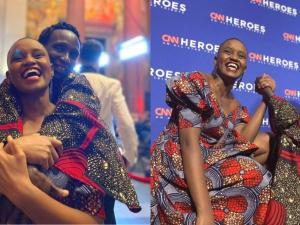
Kenyan feted as CNN hero of the year for creating computer labs for rural schools
Nelly Cheboi, a Kenyan who ditched a high-ranking job in Chicago, US, as a software engineer, in 2019 to create computer labs for Kenyan school children, has been listed as this year’s CNN Hero of the Year.
Through her non-profit organisation, TechLit Africa, Ms Cheboi has helped thousands of students in several rural parts of Kenya have access to upcycled computers that not only increase their tech skills but also improve their chances of landing tech-oriented jobs in the future.
Accepting the award, Ms Cheboi praised her mother, who she said did her best and worked very hard to ensure she and her siblings got an education.
She will bag a $10,000 as the award comes with a $100,000 prize awarded to each person in the top 10 of the CNN Hero of the Year list.
Nelly Cheboi, 28, the founder of Techlit Africa. PHOTO | POOL
However, for the first time, the 2022 winners will also get access to additional grants, organisational training and support for the Elevate Prize Foundation through a new collaboration with CNN Heroes.
As fate would have it, Ms Cheboi is also set to be named an Elevate Prize winner that comes with a $300,000 ,grant and additional support worth $200,000.
In her acceptance speech, Ms Cheboi, who grew up in the rural town of Mogotio, Baringo County, said she understood what it meant to live as a poor person and how hard work, persistence and determination could take anyone places.
“I know the pain of poverty. I never forgot what it was like with my stomach churning because of hunger at night,” she said.
Her top performance in her academics saw her receive a full scholarship to Augustana College in Illinois in 2012.
Without any experience with computers, she started her studies in the US, often handwriting papers and struggling to type them onto a laptop when needed to.
All this changed when Ms Cheboi, while in junior year took a programming course required for her mathematics major.
“When I discovered computer science, I just fell in love with it. I knew that this is something that I wanted to do as my career, and also bring it to my community,” she told CNN.
Ms Cheboi recounted how her first encounter with the computer’s basic skills was not an easy task and revealed she had to practice touch-typing, which is a skill that is now a core part of the TechLit Curriculum, for six months to pass a coding interview.
“I feel so accomplished seeing kids that are sevenbegan years old touch-typing, knowing that I just learned how to touch-type less than five years ago,” she said.
It was after she began working in the software industry that she learnt how computers were being thrown away by companies that upgraded their technology infrastructure.
This realisation pushed her to start transporting donated computers back to Kenya in 2018.
She transported them as her personal luggage that saw her handle custom fees and taxes herself.
At one point, she brought 44 computers, and she paid more for the luggage than she did for the air ticket, she said.
In 2019, she co-founded TechLit Africa alongside a fellow software engineer who also quit her job and together started the organisation that accepts computer donations from companies, universities and individuals.
The donated computers are then wiped and refurbished before being shipped to Kenya, where they are distributed to partner schools in rural communities, where students ages 4 to 12 receive daily classes and frequent opportunities to learn from professionals.
“We have people who own a specific skill coming in and are just inspiring the kids (with) music production, video production, coding, personal branding. They can go from doing a remote class with NASA on education to music production,” Ms Cheboi said.
Currently, TechLit Africa serves 10 schools and it is Ms Cheboi’s hope to partner with more than 100 schools in the next year.
“My hope is that when the first TechLit kids graduate high school, they’re able to get a job online because they will know how to code, they will know how to do graphic design, they will know how to do marketing,”
“The world is your oyster when you are educated. By bringing the resources, by bringing these skills, we are opening up the world to them,” she concluded.
https://www.theeastafrican.co.ke/tea/business/kenyan-feted-as-cnn-hero-o...

